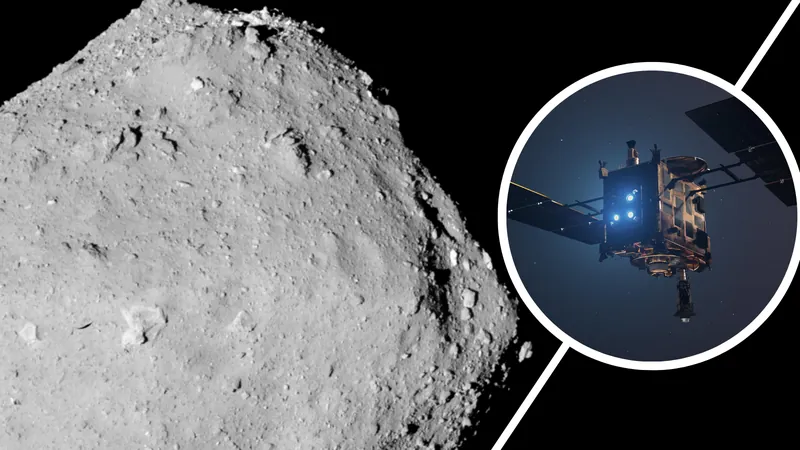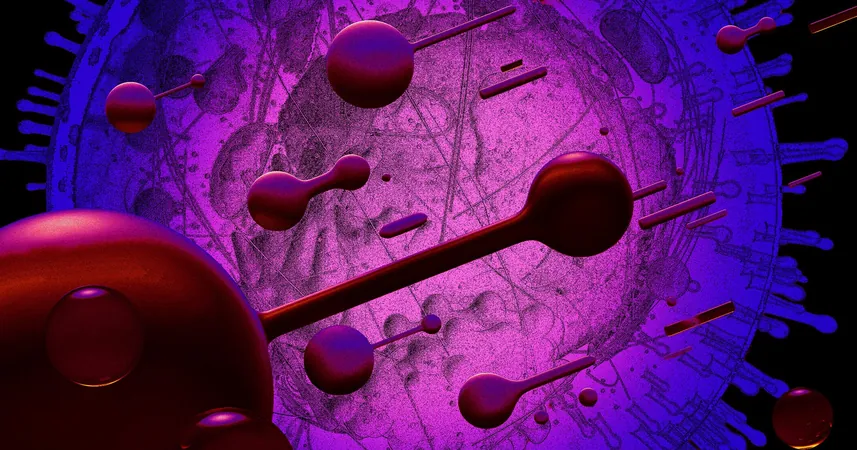
Astounding Discovery: Flowing Water on Ryugu's Ancient Asteroid Parent!
2025-09-10
Author: Wei
An Unexpected Revelation in Asteroid Research!
In a groundbreaking revelation, scientists have uncovered evidence that liquid water flowed across the surface of Ryugu's ancient parent asteroid much later than previously thought, reshaping our understanding of solar system history.
This revelation stems from a meticulous study of rock samples collected by Japan's Hayabusa2 spacecraft during its mission from 2018 to 2019, with the samples returning to Earth on December 5, 2020.
A New Perspective on Asteroid Formation!
Traditionally, carbonaceous asteroids, like the unique spinning-top-shaped Ryugu, were believed to have formed from ice and dust in the outer solar system approximately 4.6 billion years ago. They were considered to hold a "fossil record" of primordial material from our solar system's infancy. However, water activity on asteroids was thought to be limited to the early formation period—until now.
This new discovery not only alters our perceptions of how planets—including our own—formed, but also bolsters the notion that asteroids played a crucial role in delivering water to the early Earth.
Deep Insights into Ryugu's Chemistry!
Tsuyoshi Iizuka, a member of the research team and scientist at the University of Tokyo, expressed excitement: "We found that Ryugu preserved a pristine record of water activity, showing that fluids traversed its rocks long after we expected. This alters our understanding of the long-term fate of water in asteroids; it wasn’t depleted as quickly as previously believed."
This conclusion was drawn from an analysis of radioactive isotopes of lutetium and hafnium found in Ryugu’s rock samples. By examining their ratios, the scientists deduced that some form of fluid had disturbed the typical chemical composition of the asteroid's rocks.
The Catalyst for Change: Impact Events!
Iizuka speculated that an impact on Ryugu's larger parent asteroid likely triggered the ice melting and liquid water flow. "This was a genuine surprise!" he said, suggesting that this impact event could also have contributed to the disruption that led to the formation of Ryugu.
Implications for Earth's Water History!
If Ryugu's parent body sustained water for over a billion years, it suggests that carbon-rich asteroids may have been far more water-laden than once thought. This has critical implications for the amount of water delivered to early Earth, potentially reshaping our understanding of the origins of Earth’s oceans and atmosphere.
Iizuka remarked, "The idea that Ryugu-like objects retained ice for such a long duration is remarkable. It indicates the building blocks of Earth might have been much wetter than we imagined, prompting us to reconsider the conditions for our planet’s water system."
Innovative Techniques Uncover Hidden Secrets!
Remarkably, the study was conducted using samples no larger than a fraction of a grain of rice, necessitating the development of advanced techniques to isolate and analyze isotopes with unmatched precision. "Our small sample size posed significant challenges, but innovative chemistry methods allowed us to detect subtle signs of late fluid activity," Iizuka noted.
What's Next for Space Scientists?
Looking ahead, the research team plans to delve deeper into phosphate veins within the Ryugu samples, aiming to determine more accurate timestamps for the water flow on the parent body. They will also compare their findings with samples from asteroid Bennu, recently brought back to Earth by NASA's OSIRIS-REx mission, to uncover whether similar water activities have occurred on other asteroids.
This exploration marks an exciting future in understanding not just asteroids, but the early conditions of our planet.



 Brasil (PT)
Brasil (PT)
 Canada (EN)
Canada (EN)
 Chile (ES)
Chile (ES)
 Česko (CS)
Česko (CS)
 대한민국 (KO)
대한민국 (KO)
 España (ES)
España (ES)
 France (FR)
France (FR)
 Hong Kong (EN)
Hong Kong (EN)
 Italia (IT)
Italia (IT)
 日本 (JA)
日本 (JA)
 Magyarország (HU)
Magyarország (HU)
 Norge (NO)
Norge (NO)
 Polska (PL)
Polska (PL)
 Schweiz (DE)
Schweiz (DE)
 Singapore (EN)
Singapore (EN)
 Sverige (SV)
Sverige (SV)
 Suomi (FI)
Suomi (FI)
 Türkiye (TR)
Türkiye (TR)
 الإمارات العربية المتحدة (AR)
الإمارات العربية المتحدة (AR)